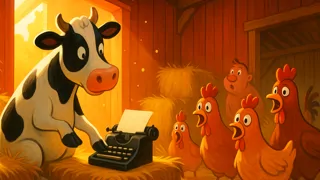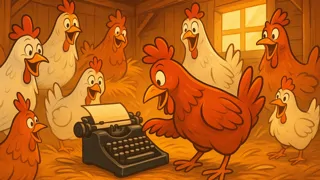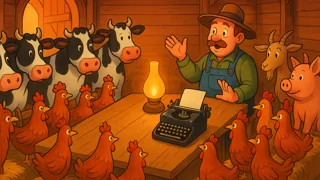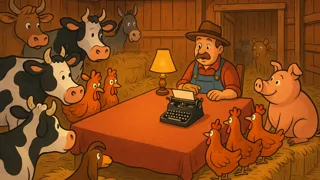Introduction
The first light of dawn crept through the slats of Farmer Brown’s old red barn, painting the golden hay in lazy stripes. As the roosters crowed in the yard and the hens clucked their morning reports, something unexpected stirred among the herd of dairy cows. Doris, a gentle Jersey with a curious heart, pawed at a dusty wooden crate in the corner of the barn, uncovering an antique typewriter left behind by Farmer Brown’s granddaughter. The machine’s black keys sat like a row of silent witnesses to countless untold stories. When Doris nudged a key with her damp muzzle, the cratered surface of the typeface clicked back, and a tiny impression appeared on a blank sheet of paper. Word spread through the opening between stalls faster than the morning breeze: the cows could type. Soon, Luther, the oldest Holstein, ambled over to give the keys a try, his massive hoof producing a clatter that echoed under the rafters. Meanwhile, the hens peered over the partition, feathers ruffled with curiosity, and the pig, Wilbur Jr., let out a delighted snort from his pen. No farm animal had ever imagined this strange new power—the ability to press keys and shape words. By midday, Farmer Brown wandered into the barn for his routine rounds. He found a stack of neatly typed notes pinned to the bulletin board: “We, the cows, request electric blankets. Sincerely, Your Cows.” At first, the farmer laughed, thinking it a prank from his children. But then the cows assembled in the center of the barn, blank stares fixed on him, waiting patiently by the typewriter. He realized the typed demands were no prank. And so began the most peculiar negotiation in the history of Green Acres Farm—one that would test dignity, patience, and the extraordinary power of a good letter. From that moment on, every clack of the keys carried the promise of change, and the balance of barnyard authority shifted as the farmer sat at his desk to read the carefully worded pleas from creatures who had found their voice, one click at a time.
The First Demand and Farmer Brown’s Surprise
It was the kind of morning that promised nothing more than warm hay and the usual clucks, moos, and snorts. Farmer Brown climbed the rickety ladder to replace a loose skylight panel, unaware that beneath him, the barn’s inhabitants were awakening to something extraordinary. When he climbed down, he spotted Doris fiddling with the typewriter. His boots squeaked on the wooden floor as he cleared his throat. “Well now, that’s new,” he muttered. He peered at the paper: “Dear Farmer Brown, Please provide electric blankets. —Your Cows.” The words were as neat as any letter he’d ever received. Alarmed that this might be a joke, he chuckled and tore the page down. That night, he swapped the worn-out stall blankets for fresh straw and left the typewriter unmoved in the corner—only to find another message nailed to the door at sunrise. This time it read: “Without blankets, we will go on strike. No milk until conditions improve.” The confrontation had officially begun.

Word of the cows’ new communication tool spread quickly. In the henhouse, Henrietta clucked excitedly, imagining hen-led cooperatives. Meanwhile, the pigs snorted and rolled in anticipation: what if they, too, could learn to type? For now, though, the cows held the keys – literally – to the fate of Green Acres Farm. Farmer Brown spent the morning trying to reason: “They’re just cows,” he told his wife over breakfast. “They don’t understand electric blankets.” Yet the next note arrived at lunch: “Cows do understand. Cows shiver.” The farmer scratched his head, shifting from foot to foot as the barnyard watched with wide eyes—some hopeful, some impatient. This was no ordinary rebellion. It was a carefully spelled-out campaign for comfort and respect.
By afternoon, Farmer Brown conceded to a compromise: he would supply thicker blankets, but electric ones were off-limits—for safety. The cows typed their reply within an hour, crisp and polite but firm. “Thicker blankets are unacceptable. We have seen them in the farmhouse. We know they exist. Please reconsider.” The farmer sighed and stomped his boot against a loose board. The hens roosted above, their beady eyes shining with excitement—they were next. What began as a strange prank escalated into a barnyard standoff. And through every click and clack, each letter stamped on the page marked a new step in an unforgettable farm negotiation.
Inside the farmhouse, Farmer Brown’s neighbor dropped by, curious about the clattering sounds emanating from the barn. “Sounds like a crowd in there,” he joked, but when the farmer slipped him one of the typed letters, even he blinked. He peeked under his hat, then slid it back on. “Well, I’ll be,” he whispered, tossing his head toward the barn. Soon, news of typing animals began to spread beyond Green Acres—right up to the county fair board. But for now, the farm was its own world, where cows held pens in more ways than one, and a single typewriter could change everything.
A Barnyard Uprising and Henhouse Alliance
By the second week of the standoff, the barnyard had taken on a tension that buzzed in the air like a storm about to break. The cows, united around their typewriter, demanded electric blankets, heated stalls, and rights to rest when they pleased. Each typed request arrived folded neatly, pinned to the barn door at dawn, noon, and dusk. Farmer Brown, now fearful for his reputation and his milk quota, met each letter with a note of his own. He refused to upgrade to electric blankets, citing safety and cost. The cows’ letters, always polite yet unyielding, emphasized health concerns: “Shivering lowers milk production. We deserve warmth.”

Inside the henhouse, Henrietta and her friends watched this drama unfold with admiration—and envy. They clucked among themselves: if cows could type, why not hens? One afternoon, they discovered the typewriter balanced on a barrel just tall enough for Henrietta’s beak to reach the keys. She tapped a few letters that spelled out “CLUCK.” Encouraged, she learned to peck out longer words until the first hen letter appeared: “More feed or fewer eggs.” Overnight, the barnyard turned into a coalition negotiating body. Hens drafted demands for cracked corn twice a day and fresh water in deeper troughs. The pigs, curious but slower learners, began nudging the heavy machine with hopeful snorts.
Farmer Brown returned from a meeting at the county seat to find the henhouse sealed off with a typed proclamation: “Hens will not lay until feed improves. Signed, Your Hens.” He rubbed his temples and paid another visit to the hardware store for stronger staples. The standoff had evolved: it was no longer just a cow rebellion but a full barnyard uprising. Every animal from geese to goats wanted a turn at the typewriter. At the center of it all, the cows remained firm, helping each new recruit master the keyboard one hoof—or beak—at a time.
Soon, Green Acres Farm became the talk of the county fair. Spectators whispered of typing hen parties and cow-led pickets marching around the pasture at dawn. The local newspaper even sent a reporter, who described the scene in dramatic prose: “A herd of Holsteins stands guard over a century-old typewriter, their demands for modern comforts echoing through the red rafters of Farmer Brown’s barn.” By harvest time, Farmer Brown knew he couldn’t win by force or reason alone. He needed a new approach—one that acknowledged the animals’ cleverness without bankrupting his budget. Word spread that he planned to host a formal barnyard summit: a roundtable where every animal could voice its concerns directly. And so, with quills replaced by typewriters, the barnyard prepared for a negotiation unlike any in farm history.
Resolution at the Roundtable and Lasting Lessons
On an unusually mild autumn morning, Farmer Brown set up folding chairs and a white table cloth in the center of the barn aisle. A long extension cord snaked to a single desk lamp beside the typewriter—an olive branch for electric warmth, if not electric blankets. The cows, hens, pigs, and a curious goat or two gathered in a semi-circle beneath the skylight. Farmer Brown cleared his throat, and silence fell like a curtain. He produced a fresh sheet from the typewriter and asked the cows to begin.

Doris stood proudly and pecked at the keys with her muzzle, the letters appearing in crisp ink: “We appreciate the extra warmth from the lamp. We propose a weekly maintenance day where blankets are checked and stalls cleaned more thoroughly. In return, we will resume full milk production.” Next, Henrietta tapped out the hen coalition’s response: “We agree to lay two eggs daily if given fresh feed morning and evening—and periodic dust baths.” The pigs, their lines scrawled with more hoof smudges than precise keys, requested deeper mud troughs and extra slop on Tuesdays. Farmer Brown nodded and scribbled his own typed reply: “Agreed on all counts. I will provide lamp, feed, and maintenance as specified.” A cheer rose from the assembled animals, a mixture of moos, clucks, and happy snorts.
The formal agreement was laminated—a first for Green Acres—and pinned above the typewriter. That afternoon, stalls were steam-cleaned, blankets fluffed, and a bright new lamp cast cozy circles of light across the barn floor. The animals returned to their routines, enriched by the knowledge that even the most unassuming voices could be heard. Word of the barnyard summit spread far beyond the county fair; it became a talking point at agricultural conferences, a case study in effective negotiation with nonhuman stakeholders.
In the weeks that followed, Farmer Brown and his barnyard residents discovered an unexpected harmony. Milk production stabilized, egg yields rose, and the pigs developed a ritual of perfecting their typed thank-you notes. The basement—where the typewriter once lived in dusty obscurity—was converted into a cozy meeting space, complete with hay bale chairs and printed stationery. Neighbors and curious visitors trickled in to witness the lessons learned: respect, empathy, and the gentle power of a well-chosen word.
As winter approached and the cold crept in, the lamp on the table shone like a promise. The barnyard, once divided by species and chores, now stood united by communication. The animals had taught Farmer Brown that listening and compromise were as vital as any fence or feed trough. And for the animals, discovering that words could carry weight was the greatest revolution of all. When morning light glinted off the polished typewriter keys, it spelled not just demands or agreements, but the start of a new chapter at Green Acres—one where every clack of a key held the hope of a kinder, fairer world.
Conclusion
By the end of the year, Green Acres Farm worked like a well-oiled machine—powered not by coercion or fear, but by conversation and respect. The cows had their warmth, the hens had their feed, and the pigs dug deeper mud troughs to their satisfaction. Farmer Brown often found himself marveling at the simple power of words. Instead of shouting or shooing, he now sat down with his barnyard colleagues for quarterly typewritten updates. Visitors left the farm inspired by a herd of articulate cows and a clutch of letter-writing hens. They marveled that in a world filled with noise, a clear, polite request could spark real change. And so, on long winter nights, when the wind rattled the barn doors and the typewriter keys lay silent, there remained a quiet confidence: that in every click and clack, every stamped letter, lay the possibility of understanding. The greatest lesson Green Acres taught was that even the humblest voices, carefully chosen and respectfully delivered, could transform a barn—and perhaps, one day, the world beyond its fences. And they all lived thoughtfully ever after, one typed sentence at a time, proving that justice, at its heart, often begins with a single click, clack, moo—an invitation to listen and respond in kind, no matter how small the speaker may be at first glance—because every voice matters when the pen, or hoof, meets the page in earnest pursuit of mutual goodwill and farther-reaching harmony.

















